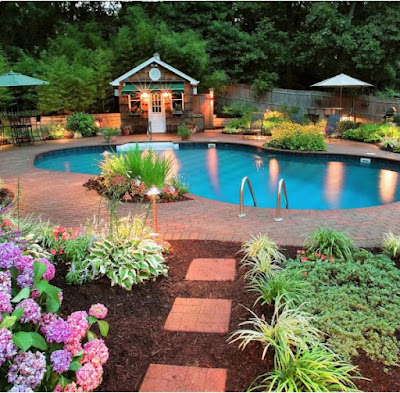Everything Homeowners Need to Know About Yard Drainage in St. Augustine
When you think about your dream yard in St. Augustine, you probably imagine green grass, shady trees, and a space where your family can relax. But one of the most overlooked parts of a beautiful and functional yard is proper drainage. Without it, your lawn can quickly turn into a muddy mess, or worse—cause damage to your home’s foundation.
In this guide, we’ll walk you through everything you need to know about yard drainage in St. Augustine, including common issues, solutions, and when to call in a professional.
Why Yard Drainage Matters in St. Augustine
St. Augustine’s humid subtropical climate means frequent rain, especially in the summer. While that’s great for your plants, it can spell trouble for your yard if the water has nowhere to go. Poor yard drainage can lead to:
-
Puddles that kill your grass and plants
-
Soil erosion that ruins landscaping
-
Mosquito breeding grounds
-
Water seepage into basements or crawlspaces
-
Foundation cracks and structural damage
Addressing yard drainage in St. Augustine is not just about curb appeal—it’s about protecting your property.
Signs Your Yard Has Drainage Problems
Not sure if your yard has a drainage issue? Watch for these common signs:
-
Standing water after it rains
-
Mushy or soggy ground even when it hasn’t rained for days
-
Water stains or mildew on your home’s foundation
-
Bare patches in the grass or landscape
-
Soil erosion along walkways or near downspouts
If you notice any of these, it’s time to consider a proper yard drainage solution.
Common Causes of Poor Yard Drainage in St. Augustine
Several factors can affect how water drains from your property:
1. Flat or Sloped Terrain
If your yard is completely flat or slopes toward your house, water can’t naturally flow away. This is one of the most frequent causes of yard drainage issues in St. Augustine homes.
2. Compacted or Clay Soil
St. Augustine has areas with dense clay soil that doesn't absorb water well. Instead of soaking in, water runs off or pools on the surface.
3. Clogged Gutters or Downspouts
When gutters overflow or downspouts dump water too close to your home, it can lead to puddles and even basement flooding.
4. Poor Landscaping Design
Improper grading, lack of swales, and incorrectly placed hardscaping (like patios and walkways) can trap water instead of guiding it away.
Best Yard Drainage Solutions for St. Augustine Homes
The good news? There are many ways to fix drainage problems. Here are some of the most effective and popular options used in yard drainage in St. Augustine.
1. French Drains
A French drain is a gravel-filled trench with a pipe that redirects water away from your yard. It’s great for soggy lawns and areas with poor soil absorption.
2. Dry Wells
Dry wells are underground containers that collect water runoff and allow it to slowly soak into the soil. They’re ideal for heavy rainfall areas like St. Augustine.
3. Grading and Sloping
Sometimes, simply regrading your yard—reshaping the slope so water flows away from your home—is enough to solve drainage issues.
4. Catch Basins and Channel Drains
These surface drainage solutions collect water and direct it into underground pipes. They’re useful in driveways, patios, and areas prone to pooling.
5. Rain Gardens
A rain garden is a shallow, planted depression that absorbs rainwater runoff. They’re eco-friendly and add beauty to your landscape.
6. Downspout Extensions
Extending your downspouts away from your house helps prevent water from pooling near the foundation.
DIY vs. Professional Yard Drainage Help
Many homeowners wonder: “Can I fix my yard drainage myself?” The answer depends on the complexity of the issue.
DIY Yard Drainage
If your issue is minor—like water collecting in one small spot—you may be able to fix it by extending downspouts, adding topsoil, or creating a small swale. These solutions are low-cost and low-risk.
When to Call a Pro
For larger drainage issues, it’s best to contact a local expert in yard drainage in St. Augustine. Professionals can assess grading, install underground drainage systems, and ensure your solution complies with local codes.
Choosing a Yard Drainage Contractor in St. Augustine
Hiring the right contractor can make a big difference. Here’s what to look for:
-
Experience with Florida soil and weather conditions
-
Positive reviews and local references
-
Licensed and insured
-
Offers a customized solution based on your yard
-
Provides a clear estimate and timeline
Don't be afraid to ask questions and get multiple quotes before starting your project.
Preventing Future Yard Drainage Problems
Once your yard drainage system is in place, regular maintenance helps keep it working:
-
Clean gutters and downspouts twice a year
-
Inspect drains and basins for debris
-
Watch for new problem spots after heavy rain
-
Aerate soil annually to improve water absorption
-
Re-grade any areas where soil has shifted
Prevention is always easier (and cheaper) than repair when it comes to yard drainage in St. Augustine.
Final Thoughts
Whether you’re dealing with standing water, soggy grass, or foundation issues, proper yard drainage is the key to protecting your home and enjoying your outdoor space. By understanding the causes, recognizing the signs, and exploring solutions, you can make informed decisions that benefit your property long term.
If you’re struggling with water problems on your property, don’t wait until it becomes serious. Reach out to a local expert in yard drainage in St. Augustine to get a professional assessment and start protecting your home today.




Comments
Post a Comment